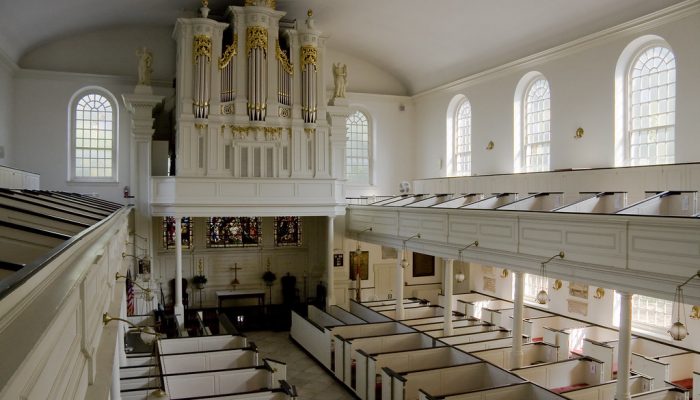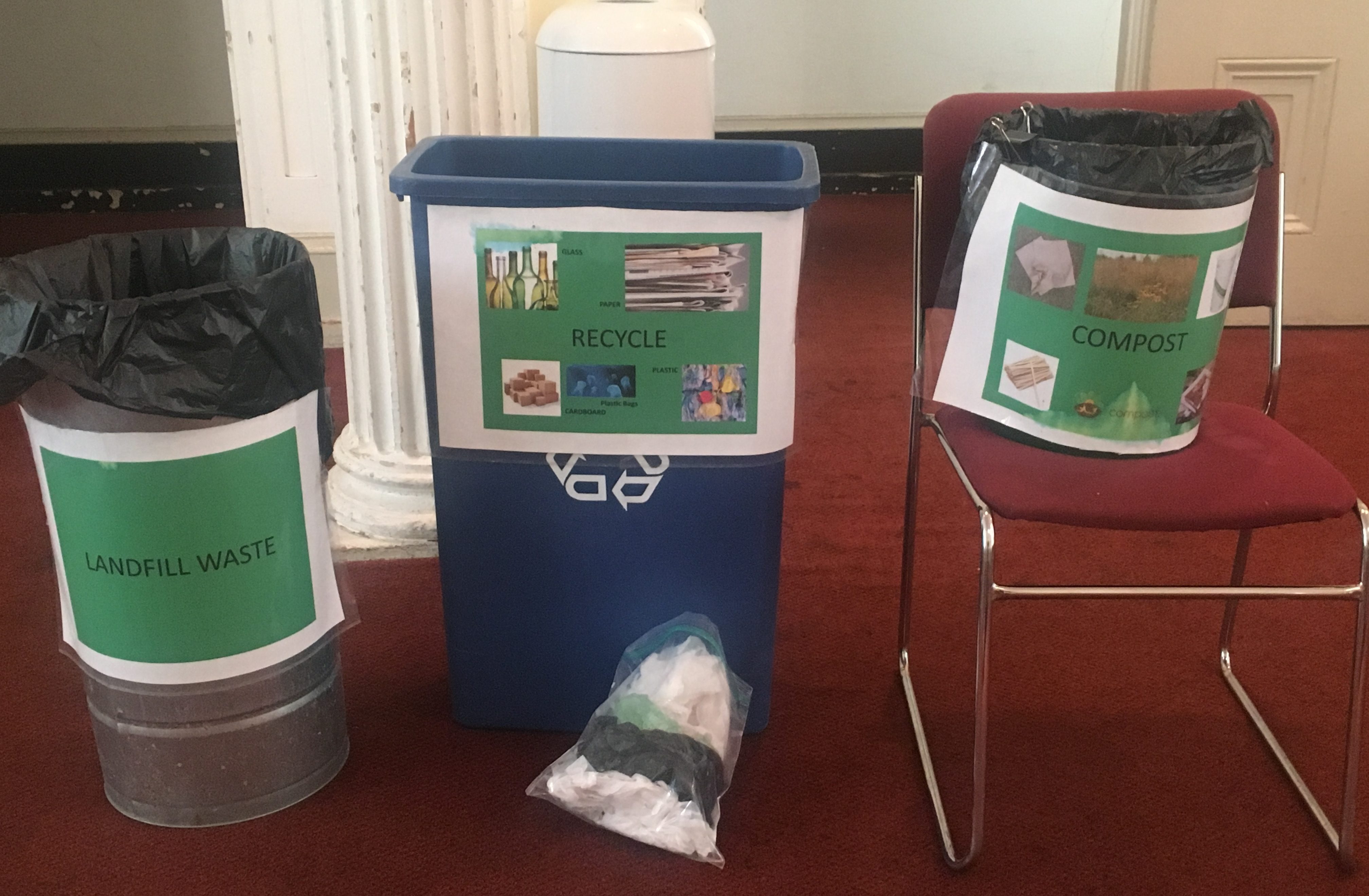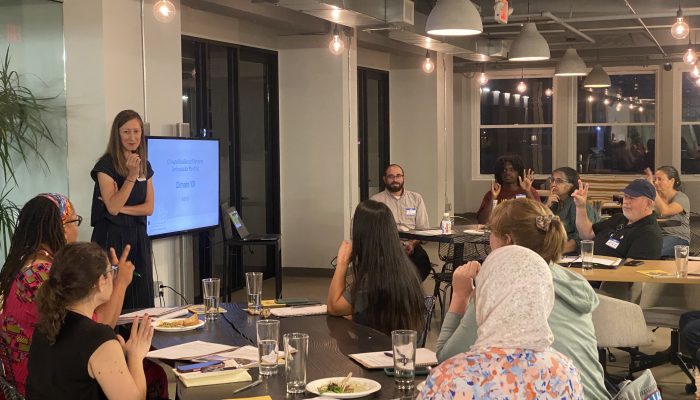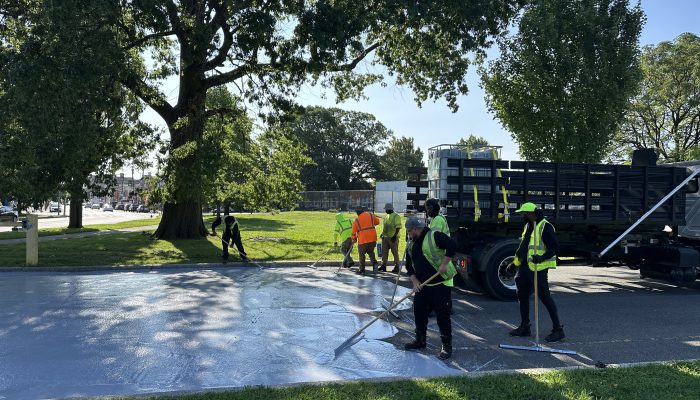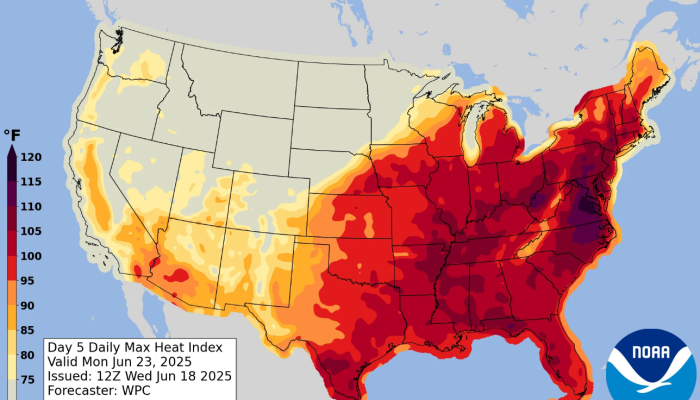“The biggest theological crisis is recalibrating our relationship with the world. We must look at the planet as rapidly changing due to human activity. I think we’re breaking God’s heart. We have to figure this out.” Claire Nevin-Field
 Claire Nevin-Field and Amy Cornelius are among the group leading efforts to respond to the reality of climate change at Saint Peter’s Episcopal Church. Claire, the Rector at Saint Peter’s, explains that, in her belief, God is the creative force behind and within everything that is. She described the story of creation as a poem of joy and creativity. “In the beginning we were all stewards of the earth. The earth was not simply a resource to extract from and humans were not at the top of any hierarchy. In the biblical poem we were created the same day as cows,” she joked. “We are to care for the earth the way God did and does- and God did not go around destroying things. All of this becomes clear in the way the story of creation is told. Humans were created within a web of things that creep about the earth.”
Claire Nevin-Field and Amy Cornelius are among the group leading efforts to respond to the reality of climate change at Saint Peter’s Episcopal Church. Claire, the Rector at Saint Peter’s, explains that, in her belief, God is the creative force behind and within everything that is. She described the story of creation as a poem of joy and creativity. “In the beginning we were all stewards of the earth. The earth was not simply a resource to extract from and humans were not at the top of any hierarchy. In the biblical poem we were created the same day as cows,” she joked. “We are to care for the earth the way God did and does- and God did not go around destroying things. All of this becomes clear in the way the story of creation is told. Humans were created within a web of things that creep about the earth.”
Claire felt called to action by the misreading of Genesis. Appalled by the mistreatment of our human and non–human relatives, she found inspiration in a book called “Ask the Beasts” by Elizabeth Johnson. In the book, Johnson describes every living being as part of a web of relationships with everything God has created. St. Peter’s honors this belief year-round and especially calls attention to it during two months each fall. “For our programming we invite people to bring in images of one of God’s creations they love. We even dressed up like animals one year,” Claire said. “Each Sunday, we focus on one aspect of God’s creation; like air, water, and earth. But, we also focus on social issues like hunger, racism, and xenophobia. We can’t look at the environment and our relationship to it without seeing injustice and the dynamics of race and class.”
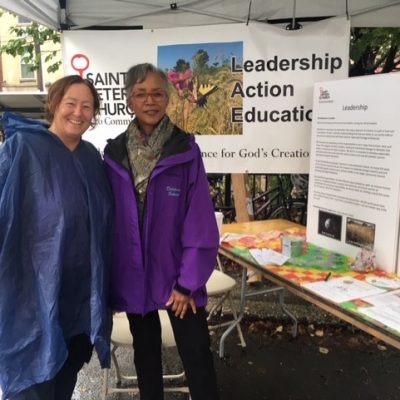 Eco Committee
Eco Committee
“We tried to create an Eco Committee 10 years ago. It failed at first, but Amy had the energy and the expertise to revive it,” said Claire. Amy Cornelius is a parishioner at St. Peter’s Church and a sustainability consultant. The Eco Committee now plays an important role in the church by creating a long–term vision where sustainability influences all aspects of the church and its functions. “We talk about the human and environmental hazards of cleaning products,” Amy said. “We’ve relamped the church with LED bulbs, resulting in a 20% drop in monthly costs. We also changed our energy supplier to power our church with 99% wind and 1% solar electricity.”
The Eco Committee engages the larger congregation by including “Eco Tips” into the weekly church bulletin. The Committee has led the effort to make other changes, including using more non-toxic, recycled, and sustainable products; changing filters in the HVAC units to remove harmful particulates from the air; changing sink aerators to reduce water usage; exploring options for green pest control; and conducting a waste audit. “The waste audit helped us to measure and identify the elements of the waste stream. Through that we identified the need for more education, better signage and better bins; we also discovered that we generate a lot of thin film plastic so have placed a bin for this in a prominent place” explained Amy.
Zero Waste Coffee Hour
After every church service, people at St. Peter’s gather for coffee, snacks, and conversation. Initially, this weekly Coffee Hour generated a lot of landfill waste. The Eco Committee decided to make the Coffee Hour zero waste by providing compost and recycling bins at these gatherings. Disposable paper products were replaced with compostable cups, stirrers, and napkins. Amy found that the biggest stumbling block to achieving zero waste was food packaging. “Often, the packaged foods weren’t healthy either, so this encouraged us to incorporate healthier options,” she said. The Zero Waste Coffee Hours have prompted more conversation among the congregation about sustainable topics, from proper trash disposal to how to avoid non-recyclable waste.
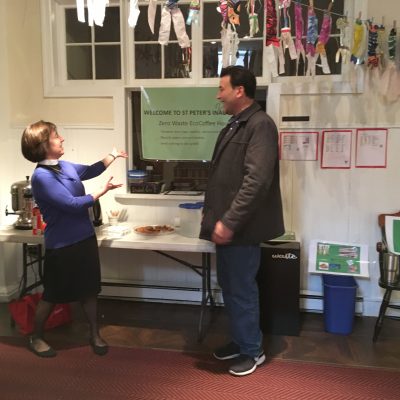 Starting the conversation
Starting the conversation
For some members of the congregation, conversations about the environment and its connections to social justice are new. To get the conversation started, Claire suggests starting with the idea of social responsibility. “In reviewing Genesis, we really have to challenge the idea that humans have ‘dominion.’” She continued, “It’s more about caring for and tilling than lording over! In the Book of Job, the last couple chapters follow God’s journey with Job and God is marveling at God’s creations. I think the right response for us in this moment is to sit in awe and recalibrate our relationship to the earth, to better reflect our interdependence.“
In 2018 St. Peter’s was among many churches to address the issue of habitat loss and deforestation stemming from the purchasing of palms for Palm Sunday. The palms are grown and harvested in Latin American countries 3,000 miles away. While other churches opted for the EcoPalm, also produced 3,000 miles away in Latin America but grown and harvested using more sustainable practices, St. Peter’s opted for a locally grown grass. This shift shows awareness about carbon emissions from transport of goods as well as the long history of resource commodification and extraction from the global south.
Pro Tips
“As a person of faith, we must remember that God is in this. While God won’t clean up our mess, remember that there are people out there doing something about it. Thinking along these lines helps us avoid feeling overwhelmed” said Claire.
- Make it visual! For the Zero Waste Coffee Hour, the compost receptacle is large because ideally, most of the waste will be composted. The trash can, which goes to the landfill or incinerator, is much smaller (the size of a small sand pail) because the goal is to reduce the amount of waste disposed of in this way.
- Repetition is important! For those well versed in zero waste and sustainability, it may be hard to communicate to those with little to no exposure.
- People fail when attempting to do too many things at once. There needs to be someone in leadership with the skills to analyze, advise, and put things in motion. Over time, you quietly build interest and spark conversation that can lead to larger actions and initiatives the group can take on together.
Claire ended our conversation with the following quote by Martin Luther, a German theologian and religious reformer “If I knew the earth was going to end tomorrow, I would plant a tree”

